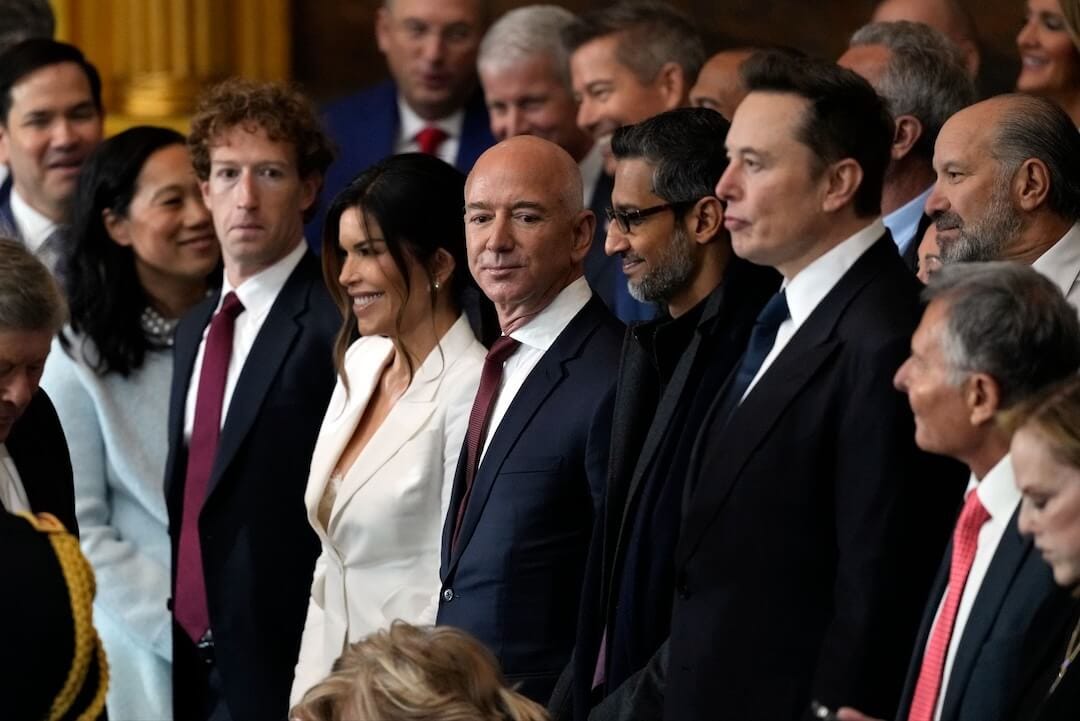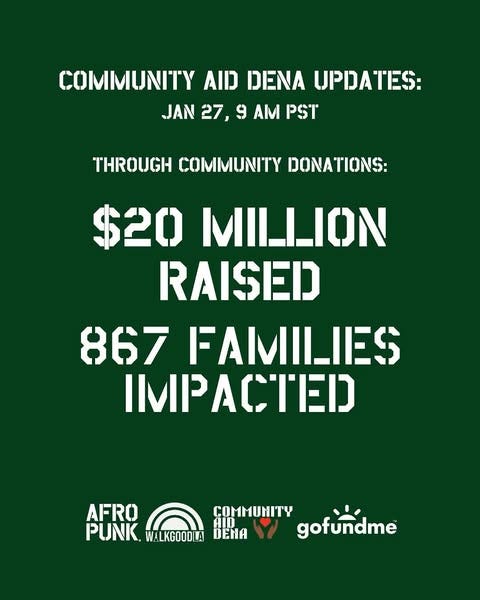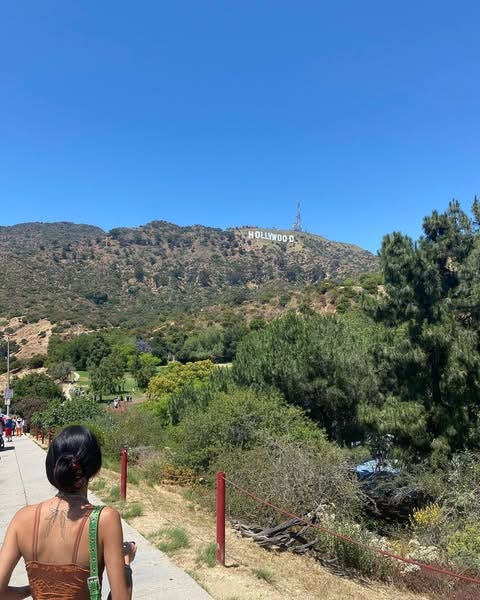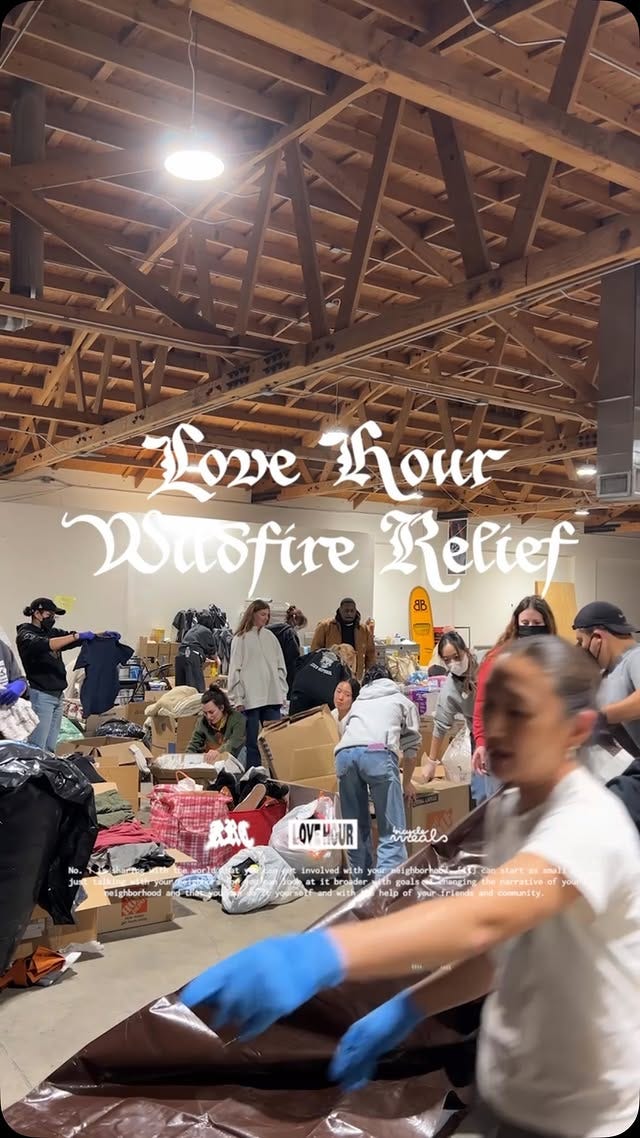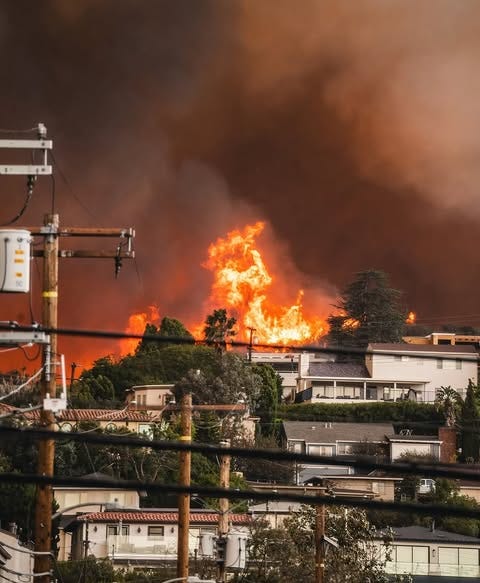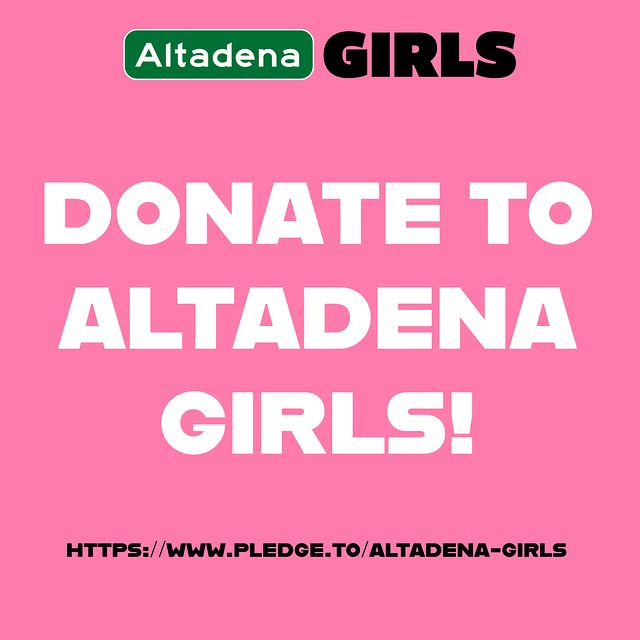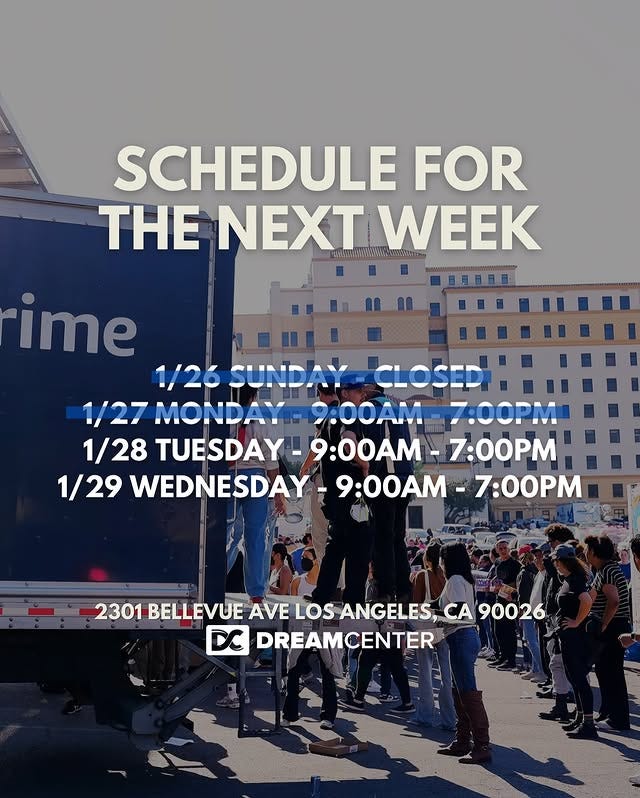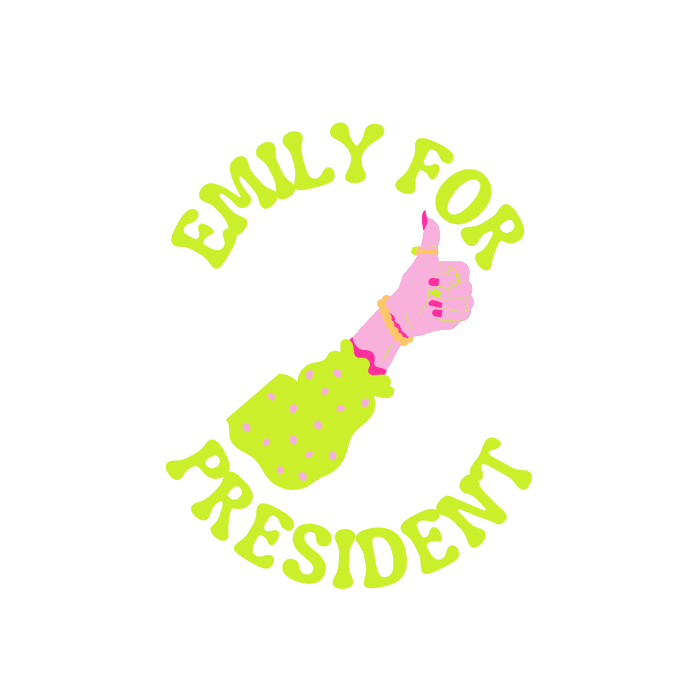I Specifically Asked for a DISCO Inferno
Or, why we need to keep talking about the wildfires in Los Angeles
This post is too long to appear in full in your inbox. I don’t know where it will cut off in the email version, but it will be available online. See you there!!!
As we enter the 51st week of January, I want to share an affirmation I’ve been telling myself every hour on the hour this week: you cannot consume it all.
My social media feeds have been oscillating violently between hopeless (literally just people sharing the news) and hopeful (pet reunions in LA and cute winter boots). Worse still, even after my unbanned TikTok FYP went back to normal, scrolling has also lost the passive mindlessness I crave now that I physically cannot stop myself from thinking about how my data is being sold to the highest bidder.
Meanwhile, in reality, the Trump Administration has taken to the shock doctrine strategy a bit too eagerly. No, you’re not going crazy from the sheer volume of horrifying shit he’s throwing out on the table with his asinine executive orders and tariff threats and general existence as our president—according to author Naomi Klein, the “shock doctrine” is when
political actors exploit the chaos of natural disasters, wars, and other crises to push through unpopular policies such as deregulation and privatization. This economic "shock therapy" favors corporate interests while disadvantaging and disenfranchising citizens when they are too distracted and overwhelmed to respond or resist effectively (X).
While authorizing ICE raids and accidentally declaring that everyone in America is a woman are not acts of deregulation and privatization (although as I write this, the Senate has just confirmed a Treasury secretary who is expected to focus on deregulation), we can clearly see this administration favoring corporate interests while disadvantaging and disenfranchising citizens already.
The best advice I have is the exact practice I’ve put in place for myself: take in and process as much as you can and then take a break. You cannot consume it all. Yes, it is critical to stay informed and aware, but not at the expense of your sanity. This is the same practice I am trying to implement with this newsletter specifically. There will always be some fresh horror to cover, but we only have so much time together each week (you’re welcome).
Without further ado: this week, we are focusing on something that still deserves our attention. Today, I talked with Abi Marin who wanted to share her experience living in Los Angeles this past month, what she has learned about herself and her adopted city, and how we can all continue to help those affected by the ongoing wildfires.
Abi Marin has lived in LA for 3.5 years and loves this city with her whole heart. She's worked in music since high school and has gone on to work for some of the biggest (and soon-to-be-biggest) names in music. She is a karaoke bar regular, AMC A-Lister, dreamer of owning a conversation pit, victim of little treat culture, and one more inconvenience away from bleaching her eyebrows again.
“Like a Panic Attack, But Worse”
Since the Palisades, Eaton, and Hurst fires broke out on January 7th, over 16,000 structures have reportedly been destroyed across 55,000 acres. As of this writing, the Palisades, Eaton, and Hughes fires are all still active in Los Angeles County, though each is at least 95% contained. While it feels like the worst of things may finally be over, I don’t want to jinx anything: although LA is finally receiving the most rain it has seen in nine months, there is now a threat of mudslides as a result of the burn scars left by the fires.
More importantly, the “worst being over” does nothing to bring back what has already been lost. Some people had literal minutes to evacuate their homes while others didn’t even have that. It can be easy, in times of immense tragedy, to look at the big picture to spare ourselves from having to grapple with the real human suffering that results from it. But, at least to me, it seems the fires unfolded at a moment when many of us are craving the basic function of empathy. On TikTok, particularly pre-ban, countless individuals shared their harrowing stories as they were also sharing resources with others in the fires’ paths.
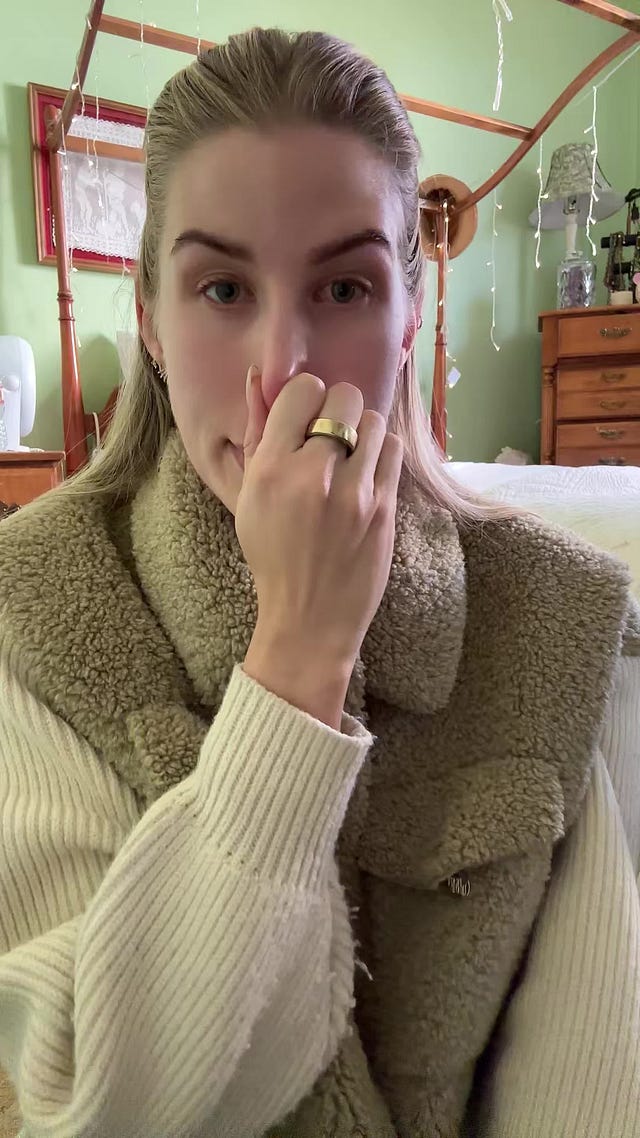
 Tiktok failed to load.
Tiktok failed to load.Enable 3rd party cookies or use another browser
Abi and I stayed in contact through the week of January 7th. Though I knew she was safe from the fires themselves, I didn’t realize until reading her responses for this piece just how many other non-fire problems people had to deal with because of the fires. This section is just one response because even though Abi was, by her assessment, one of the lucky ones, her experience highlights how this is all much bigger than just the fires themselves, and just how much time and effort it is going to take for LA County to recover:
Emily: What was your experience like living through the worst of the wildfires?
Abi: Luckily, I was not personally affected by the fires, let me start by saying that. The smoke and ash, however, is another story.
For a play-by-play: Wednesday we were all keeping an eye on everything—the Palisades fire (Malibu area) and Eaton fire (Pasadena area) had started growing and nobody I knew was affected yet. I was planning on going to see Nosferatu of all things that night, but on my way home, roads were blocked off by a brush fire and it terrified me enough to stay home.1 No one knew what was coming.
By Wednesday night, both fires had grown catastrophic, and the Sunset Fire exploded. I had lived in Hollywood for three years, and had I still lived in my old apartment (that I moved out of in October), I was just on the line to evacuate. My friend Ari is still in Hollywood, and she was forced to evacuate to Long Beach.
I was told by everyone I know to pack a go bag just in case, as the winds were picking up and anything was possible. My landlord texted me saying to buy masks and pack my valuables just in case, and that she was standing by for any evacuation orders for my building and keeping an ear out. I sped home from work and grabbed every suitcase I owned.
The panic of having to decide what is most important to you is a fear I've never felt—the pang in my chest was like a panic attack but worse. Tears burned my eyes as I tore apart my apartment stuffing things like my mom's vintage jean jackets, my childhood teddy bear and blankets my grandmother had knitted me, the painting that used to hang in my parents' basement that I brought across the country, and my old copy of Twilight and signed copy of Julia Fox's memoir. It's wild what you grab in a panic.
Abi (cont.): I was going between sobbing so hard I couldn't see about the prospect of leaving behind the life I'd built for myself, and locking in to pack what I needed. I packed a bag of canned goods but no can opener. A mirror I bought off Facebook Marketplace. My favorite going-out shoes. My unopened salad dressing. My One Direction tour t-shirt.
With everything (2 full suitcases, 5 bags, 3 boxes) in my car "just in case," I woke up to drive to work on Thursday. Walking outside, it looked like the first flurries of a snowfall. The sky was orange. It was ash—my car was covered in a thin layer of silvery black ash. I got in and learned that my coworker was watching the news last night and saw her apartment building in the Palisades on fire. Luckily she and her dog had evacuated, but they only had one suitcase as she thought the fire had gone more east and she'd be able to go back.
My other coworker was raised between Altadena and Pasadena and was housing four evacuated groups of friends and families, two of which had discovered their houses had burned down. Another two fires had sprouted up and I was glued to my phone and the WatchDuty app all day, which has become a saving grace to everyone. It's an app that California firefighters use to communicate news about fires—where they're popping up, the number of acres burned, the affected and evacuated areas, and the percentage of which has been contained.
One of these fires was in Woodland Hills (which we later found out was started by a fucking arsonist), viewable from my friend Karina's parents’ house. She told us they were evacuating and bringing her, her boyfriend TJ, and her roommate Alyssa to Anaheim and asked if I wanted to come. The air index was over 100 across the city (a healthy level is under 50), and where I was in Koreatown, the index was 192. I decided to go with them that night to avoid the toxic air and drove an hour to meet them.
Abi (cont.): I stayed in Anaheim on Friday and went home on Saturday afternoon after going to see The Last Showgirl for one more moment of normalcy. Friends sent in donations, and I picked up a full cart of toiletries at the Anaheim dollar store.
Returning home was eerie—half the city had evacuated elsewhere, and there was an emptiness you only see during Coachella when everyone is in the desert. Businesses were closed and boarded up, and everyone outside wore a mask. It truly felt like the beginning of COVID all over again.
I got the least of it, but the trauma of living through a tragic event is just starting. I didn’t unpack my car for a week and a half because I was convinced that I would still have to evacuate. I felt uneasy in my own home, wondering if the ash was coming inside. We as a society never unpacked the trauma that COVID caused, and I feel like that's going to happen all over again with this.
I was just expected to go back to work—my coworker whose apartment burned down was expected to go back to work—and act like nothing happened, business as usual. The fucking corporate greed and lack of empathy I and many others experienced was so eye-opening.
I wish I had something witty or insightful to say here, maybe something directed at those who still only recognize the value of empathy when it’s something they’re seeking for themselves. But I don’t.
Is that too dystopian? Should we talk about climate change instead?
She’s Sooooo LA (Complimentary)
Team, I have something to confess: I don’t think I’m meant to be bi-coastal. Despite the fact that I’ve been a lifelong Dodgers fan for the past three years, I didn’t feel any connection to LA when I’ve visited…I think I’m content to be a guest there forever. But (as I learned as a result of the fires) I have so many friends who have made LA their home and I feel a distant fondness for it because of them. And also New Girl.
By the way: something no one ever told me about LA until literally last October is that LA isn’t a city but a county of smaller cities. I just believed Los Angeles was one big city for 26 years and no one told me otherwise!!! Like Boo Boo the damn Fool!
Anyway, more importantly I guess, I wanted to continue talking with Abi about her personal experience so I asked:
Emily: What has living in LA during this time shown you about the area?
Abi: LA is always ragged on for being fake and vapid, but this has really shown me now more than ever that there is heart in Los Angeles above all else. Seeing the entire city volunteering, fundraising, organizing—it was a big fuck you to everyone that says LA has a "dark" or "evil" energy. Everyone came together.
The number of texts I got from one-time acquaintances in the city checking in to see if I was ok, old bosses, and influencers donating their whole closets, immediately organizing—it was heartwarming. I spent many nights tearing up about how good my city is. LA knows how to spring into action, LA knows how to organize, and LA cares about their fucking community.
Emily: What has living in LA during this time shown you about yourself?
Abi: I know I wasn't the only one, but I had an existential crisis. I work in music, and I mayyyyy have crashed out wondering if what I was doing was helping in the grand scheme of things. But then I got a DM from an old friend from college that really brought me back down to earth. They said that now more than ever, people need art. The escapism of art is what people need (in this crisis, political climate, burning world, etc.....).
But it also showed me that I need to become a minimalist. There's nothing like imagining your apartment building burning down and grabbing all of your essentials to show you what you never fucking use. I am a trinket girlie at heart, but maybe I do need to pare down.
The fires almost immediately became the most destructive in LA history so it made sense why people wanted to figure out what caused them. While each of the fires seem to have started in their own way, there was one factor that united them all: earlier this month, the Los Angeles Times published a piece discussing a UCLA analysis which found that
if you break down the reasons behind the extreme dryness of vegetation in Southern California when the fires started, global warming likely contributed roughly one-fourth of the dryness, one of the factors that fueled the fires’ explosive spread. Extreme heat in the summer and fall desiccated shrubs and grasses on hillsides, they said, enabling those fuels to burn more intensely once ignited.
The scientists said without the higher temperatures climate change is bringing, the fires still would have been extreme, but they would have been “somewhat smaller and less intense.”
Although the UCLA scientists made sure to point out that “more detailed peer-reviewed studies that examine the influences of climate change and natural factors will take time, and that they prepared their analysis as a starting point for deeper research,” other climate scientists have agreed with their assessment.
More to it, a different but related study published in the journal Nature this month found that “whiplash” hazards as a result of hydroclimate volatility (or, natural disasters that are caused by quick shifts between extreme dry periods and extreme wet periods in a climate) have increased considerably since the mid-twentieth century.
All of this is to say that while climate scientists may have envisioned a world in which California was unfortunately prone to a disaster like this at this time, girlies from the East Coast don’t usually deal with wildfires or go more than a month without rain. This past fall in New York notwithstanding, I was curious to know:
Emily: Coming to LA as an East Coast transplant, what is something you wished people outside of it understood?
Abi: What I have learned from LA natives is that this isn't normal. Friends whose families have been here for generations have never had to evacuate. Even in more fire-prone places like Malibu, this is so unusual. LA is known for being a sunny place, but we typically have a "wet season" in the winter (usually between November and January), which we didn't have this year. It hasn't rained in nine months.
Climate change is about extremes (I HATEEEEE the term global warming with my whole heart because idiots always say, "But it's cold there can't be global warming!!!!!")—last year we had unprecedented rains, which led to these gorgeous wildflower blooms across the California coastline, but it also caused insane mudslides. And then all of this new vegetation that is used to an extremely wet season is now exposed to the driest conditions SoCal has ever seen so dried up.
The Santa Ana winds are a yearly phenomenon (that has all these spiritual superstitions surrounding it) that causes wildfires, and all of this newly dried vegetation lit up in an instant.
As an East Coast girlie, I had no idea about any of this. I knew LA had fires and earthquakes but living here, you realize you'll survive 100 mini earthquakes a year and probably one big one, and that the fires usually don't affect you if you don't live on the coast, until now.
To Abi’s point about global warming, I would be remiss not to share a recent comment I overheard. Last week, I was unwittingly eavesdropping on a phone call taking place entirely out loud in my office. In the middle of it, one party remarked that “it has been so cold here [in New York City] that it gives me hope that climate is not that bad yet.”
I need you all to hold my hand when I tell you this: I am citing a NASA site for kids to explain why climate change is also responsible for extreme winter weather. My goal, as it has always been here at E4P, is to try to make big concepts more digestible and I just thought that if kids can understand this, surely the very smart people of corporate America can, too:
…global warming does not mean that it will never get cold where you live. For many places, a blizzard, snowstorm, or freezing temperatures can and do happen each winter. That’s because weather and climate are different things. And the weather is affected by many things.
For instance, it may seem far away, but the weather and climate in the Arctic can actually affect our weather in the U.S. It can change how much cold air moves south and influence how storms travel.
Some changes in the Arctic can happen naturally, while other changes are because of human-caused climate change. To monitor changes in the Arctic, scientists began measuring its ice and weather in 1979 with satellites. With this information, they found that the area is warming faster than the rest of the planet because of climate change. This change in the Arctic is leading to fewer cold snaps over the U.S. as time goes on.
There is another way human-caused climate change is impacting cold weather. As the planet warms, the air can hold more moisture. That can lead to heavier snow and rainfall than usual. It can also change patterns for where it rains and snows…There will likely be fewer cold days in our future due to global warming. That being said, many places will still have at least some cold days in winter. So make sure to hang on to those warm winter coats and long underwear, too!
Now that I’m done being petty, I can admit that I like this source for another reason: I think there needs to be better, clearer, and unpoliticized education on what climate change truly is. Without it, it’s all too easy to act like the fires in LA are tragic, albeit freak events that are not doomed to become evermore commonplace in the coming years.
I’m not naive enough to expect this will happen under this administration (lower the cost of groceries…or pull out of the Paris Climate Agreement?) but maybe then we can all start being more frank about climate change with each other in the meantime.
How We Save Ourselves: West Coast Edition
When Abi returned to Los Angeles, she sent me a message that echoed her earlier comments about feeling overwhelmed by the community and support she immediately saw. Brands, celebrities, and regular-schmegular people from all around the country were donating money, goods, and time to help those impacted.
As someone who could only watch this from a phone screen, I wanted to know:
Emily: What has been your experience returning to LA and volunteering?
Abi: I had put my Venmo on my IG story and friends from around the country had sent in donations, so I had gone to a dollar store in Anaheim and stocked up a full cart to bring back.
I had planned on bringing my haul to Altadena Girls, an organization started by an 8th grader to provide young girls with items to rebuild post-fires, and volunteering after I dropped off. I went with my friend Alyssa and we arrived around 9 am, and while parking, we saw a line around the block to drop things off. After I dropped off, Alyssa (who was in line ahead of me) said they were starting to turn away volunteers.
Abi (cont.): There were tons of volunteer opportunities people were posting, so I went to the next one. Turned away, too many volunteers. My local KTown YMCA, turned away, too many volunteers. WalkGoodLA, turned away, too many volunteers. The Harriet Tubman Center, turned away, too many volunteers. I watched in real-time as the master document of volunteer opportunities all turned red for being full of volunteers.
It was amazing to see the lines and lines of cars wrapping blocks to help out. People with bigger cars who got turned away to volunteer instead volunteered to drive boxes of supplies out to Malibu and Altadena. LA showed the fuck out.
Emily: Why do you think natural disasters or other tragic collective events bring out both the best and worst in people instead of just one or the other?
Abi: I believe that people are naturally good despite it all. We can get into the theory of all of that, but ultimately those who want to help will, those who have lived here and see their neighbors suffering will want to help. People rise to the occasion. Man (but not men) is good.
But it also brings out the worst in people. Every city attracts grifters—LA is notorious for doing so—and those grifters will indeed grift no matter the occasion. There were some reports of "looting" (I think the real looting is the corporate landlords who jacked up their listings 400% after the fires, but I digress), arsonists, break-ins to evacuated houses, and the typical post-disaster stuff.
But there were also the social media vultures—the literal pond scum of the Internet, like Leo Skepi and Tara Lynn (Miss “I finna be in the pit”/bird fucker herself). They started spouting off nonsense about homeless people who want to break into your home and fuck you up, and how you have to protect yourself and be ready—typical riling up the troops, fearmongering, borderline right-wing bullshit. And god, the conspiracy theories. If I hear one more whackjob say that """""they"""""" "burned Hollywood down to burn evidence for the Diddy trial," I'm going to fucking snap.
I think ultimately, the good outweighs the bad and people want to help.
Much like our data, our attention has become an increasingly valuable commodity. What you spend your time doing or consuming often drives sales, even if the thing you’re consuming is vital news. Just as it’s impossible to consume all of the news all of the time, it is almost equally impossible in this day and age to focus on one thing and nothing else. Even one of my favorite Substacks—Jessica Valenti’s Abortion, Every Day—incorporates analyses of electoral politics and social media into the general conversation around abortion access.
What I mean to say is you are not wrong for looking away from the fires to watch something else. But we should continue to look back because even as the news moves on, the recovery process in LA has only barely begun. I wanted to ask Abi:
Emily: Are you nervous that people who are not in or from LA are going to move on too quickly? If so, how can people remain engaged in helping those most impacted by the fires?
Abi: Absolutely. With Trump's inauguration and impending shitstorm (which has...already started), the 24-hour news cycle, the “TikTok ban,” and people's personal lives, I feel like most people have already moved on, and January isn't even over.
We need to keep posting about it—we're all on social media, and this is only the beginning. We're still assessing the damage of what's been done. There was a new fire that sprouted up today a week later. People can't even go back to their homes yet. Malibu and the Palisades are still blocked off unless you get a police escort to your place. It's still happening so we need to keep this in the forefront of our minds. I know it's hard with our horrible attention spans, but we need to keep helping as we'll be rebuilding for months and years.
Also, our mayor is doing jack shit. Karen Bass cut the firefighter's budget and then UPPED THE LAPD BUDGET BY MILLIONS OF DOLLARS.
And what did I say last week? Something to the effect of “our elected officials will not save us,” perhaps?
Another reason to not fall prey to the shock doctrine and look away for too long is the impending challenge of making sure everyone affected not only continues to get the help they need in the short-term but that they all receive the necessary assistance to rebuild their homes. According to a Reuters piece from January 12th, “Many Altadena residents said they were worried government resources would go to wealthier areas and that insurers might short-change those who cannot afford to contest denials of fire claims.” Everyone, whether or not they’re Paris Hilton, deserves the opportunity to put their lives back together after this tragedy.
Through social media, I’ve seen what Abi shared about LA coming together. I’ve watched people the two of us grew up with share resources and donation links from an entire nation away from the fires; you can tell people care. Whether it’s out of fear that we might be the next region to experience a heartbreaking natural disaster or, just maybe, it’s simply out of the goodness of our hearts, the drive to help those affected by these fires feels like the sign of the times we ought to be clinging to more than anything else.
I wanted to end today’s piece by asking Abi:
Emily: How can people outside of LA continue to help with the recovery? What is still needed for firefighters and people who have lost everything in the fires? Where can people in LA continue to get involved in providing assistance on the ground?
Abi: I believe at the moment we are overrun with clothing, but toiletries are still needed. Money is probably the easiest way to help—the LA Firefighters Fund, the fund for Incarcerated Youth Firefighters (disheartening that I even have to write that), the Red Cross needs blood—and more.
I know benefit concerts are popping up everywhere, so even if you can't go, consider buying a ticket or donating via the links on their pages. Gift cards for gas, groceries, Costco, DoorDash, hotels, Ubers, and restaurants are good too. Comfort items, for a sense of normalcy for kids going through losing their homes and schools.
Ask your LA friends what people need.
Check out Brady Goodman-Williams’ collection of support links here, especially if you’re able to volunteer in person in LA.
Thank you a billion to Abi for wanting to talk first and foremost about the good parts of this nightmare—the support and the community—and for sharing her experience with all of us!!!!
Check out her new Substack here and don’t forget to subscribe!!!
Side note—I saw Nosferatu last week. 4 stars.



